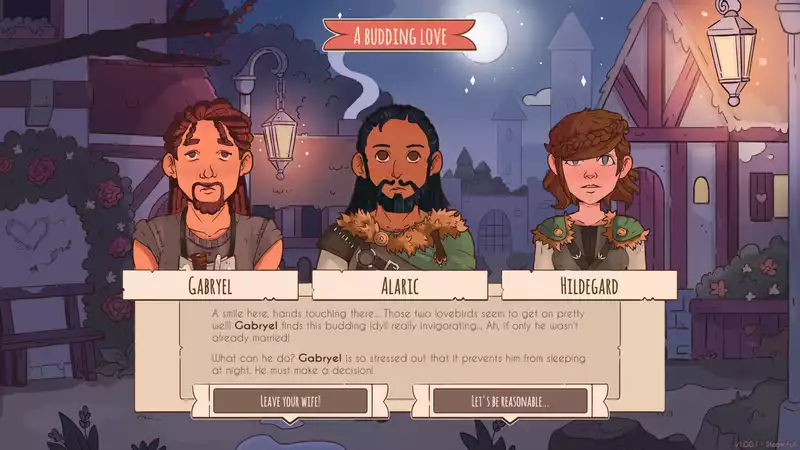A villager dies in his forties, leaving behind a beloved partner and a young child, after hard labor in questionable working conditions. How will their widow (or any widow) react in "Lakeberg Legacies," a self-described "society-based village management sim where love is the favorite resource"? They want to remarry, instantly, instantly. You would think that they would at least wait for the corpse of their past love to cool down before shacking up with someone else, but according to this game, that's not how love is supposed to work.
This is one of the strange contradictions lurking in a superficially cute and cozy game that insists on putting the lives and bloodlines of randomly generated people passing through my village first, while giving them no more personality than an Age of Empires shepherd.
Lakeburg Legacies at least starts off on the right foot, making it clear that sexual preference is irrelevant here. Anyone can marry someone who is not related to them by blood, and any couple can have children. That would be great if the whole business of "falling in love" wasn't just a quick click through of three micro-scenarios chosen at random from a disappointingly small list. Apparently, all it takes to fall in love is for me, the disembodied cursor, to correctly remember at least one of the short list of likes and dislikes of a potential partner.
Ah, so you don't like flowers either, but have the opposite opinion about public executions. Marital bliss.
Lakeburg is a game with 10 clever ideas, but trips into 20 ways to ruin it. It extends to the way it treats peasants and nobles of past generations. Children are the lifeblood of the village, the continuation of loving families, heirs to the village throne, apprentices to the masons, and so on. They are also automatically evicted from their homes the moment they turn 18 and are officially homeless unless they are manually assigned a vacant house. The game's only solution to this self-inflicted problem is to let literal infants wander the streets until they die or survive to adulthood.
This is not only incompatible with the community-oriented village atmosphere the game is trying to promote, but also shows a clear lack of imagination. The game can show me the exact relationship compatibility debuff that occurs when a married couple does not root for the same champion in a jousting tournament, but when a married couple has to live in two houses or temporarily squeeze two children into one bedroom, productivity and I can't imagine a mild blow to their sense of well-being; I can't imagine an 18-year-old child being saddled with some sort of undesirable "can't leave the nest" trait while they find the resources they need to build or allocate an empty house, or simply have time to notice" My villagers, honestly, do they take their own children so lightly?
Building up the village these villagers live in forms the other half of the game, and at first it seemed like a lot to understand. This is because although "Lakeburg Legacies" is chock-full of stats, most of the interactions are frustratingly hands-off.
I can't decide where to place the buildings, or even how many of them. It causes problems with both the personal and productive aspects of the social sim experience. I cannot build a manufacturing district in the center of the village, nor can I give the workers a home in the most beautiful place and relegate the royalty to an awful place. We cannot choose to build a village that thrives on the export of manufactured goods, nor can we choose a village that values the arts and welcoming social gatherings above all else. You cannot even build two lumberjack inns if there is a continual shortage of wood or if the number of skilled logging workers outnumbers the vacancies.
And while there was more to do as the game progressed, all that clicked was more of the same. Build enough houses for everyone, make sure people have jobs that they aren't hurting for, get them married to the best partners as soon as possible, upgrade the facilities as much as you can. That was done. I didn't see any difference if I could suddenly live my life as an assassin, a blacksmith, a disgruntled mentor to an eager apprentice, or even a queen. I did not see the clothes that the seamstresses spent their lives sewing, or the paintings that the villagers said they loved so much, or the people who went out to the fields in the morning. Instead, I stared at the same big picture for hours and hours, watching the villagers' lives reduced to sticks and numbers.
It's an oddly impersonal experience for a game about relationships. I am not a small village chief with big dreams, but a detached godlike figure, so I don't have to worry about being ousted by an angry mob if I don't live up to expectations. There are no rival villages to compare my efforts or tempt me with higher quality villagers. Nor do the villagers seem to care much for each other or take pride in their work. The only real goal is to accumulate "fame," a substance that can be acquired momentarily and passively. When the pre-allotted number of years in the game runs out, it serves as an end-game score, which can be converted into coins to unlock artwork depicting the general life scene of the village in the gallery. There is no point in trying.
Lakeberg Legacies likes to make the villagers seem like they have dreams and hopes, but they and I are treated only as production units, not people.
.

Comments